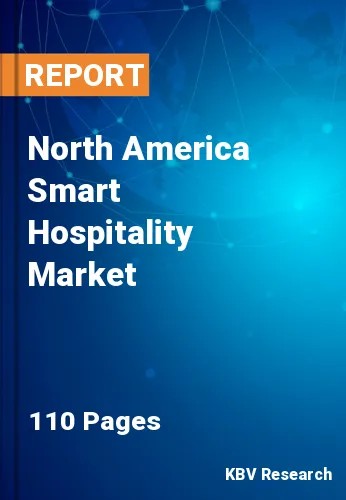The North America Smart Hospitality Market would witness market growth of 27.9% CAGR during the forecast period (2022-2028).
From the aspect of a hotel owner, the increased sustainability potential is one of the main benefits of a smart hotel room. This mostly has to do with potential energy-saving features within the hotel rooms, which the Internet of Things automation can help with. A smart hotel also presents tremendous prospects to provide personalization. For instance, TVs can be remotely configured to address visitors by name, and visitors can modify the room's settings using a central control point. The numerous gadgets can then automatically create such settings owing to IoT technology.
Additionally, guests may be able to access their personal accounts on services, like Netflix or Spotify due to smart TVs and speakers. In fact, market players within the hospitality service anticipate releasing a feature in the coming years that would allow visitors to access their own audiobooks as well as music files by logging in with their accounts.
Access to information is one of the main advantages of smart hotel technology for guests. This might entail a visitor asking a question using their voice on a device and then listening to a reasoned answer. However, other hotel services can also be connected to gadgets. For example, a consumer might be able to receive restaurant availability information using a smart hub. This can be linked to the reservation system for the hotel restaurant, providing real-time information.
The travel and tourism industry is growing at a very rapid pace in the United States as it recovers from the impact of COVID-19 impact. According to the United States Department of State, the travel and tourism sector supported millions of employments in 2019 and added more than $1.1 trillion to the US GDP. In 2019, there were 317,000 jobs in the restaurant industry in New York City alone. The COVID-19 pandemic had a significant impact on the industry and has all corporate operations stopped. However, the government is working and increasing its efforts to accelerate the sector's recovery from the pandemic. In 2022, the Tourism Policy Council of the US released the 2022 National Travel and Tourism Strategy.
The US market dominated the North America Solution Market by Country in 2021, and would continue to be a dominant market till 2028; thereby, achieving a market value of $8,183.8 million by 2028. The Canada market is anticipated to grow at a CAGR of 29.5% during (2022 - 2028). Additionally, The Mexico market is experiencing a CAGR of 28.4% during (2022 - 2028).
Based on Offering, the market is segmented into Solution (Property Management System, Guest Experience Management System, Integrated Security Management, Facility Management Software, Network Management Software, and Point Of Sale Software) and Services. Based on Deployment Mode, the market is segmented into Cloud and On-premises. Based on End User, the market is segmented into Hotels, Cruise, Luxury Yatches, and Others. The report also covers geographical segmentation of Smart Hospitality market. Based on countries, the market is segmented into U.S., Mexico, Canada, and Rest of North America.
Free Valuable Insights: The Global Smart Hospitality Market is Estimated to reach $58.3 Billion by 2028, at a CAGR of 28.4%
The market research report covers the analysis of key stake holders of the market. Key companies profiled in the report include NEC Corporation, Huawei Technologies Co., Ltd., Oracle Corporation, Samsung Electronics Co., Ltd., IBM Corporation, Cisco Systems, Inc., Siemens AG, Johnson Controls International PLC, Honeywell International, Inc. and Legrand S.A.
By Offering
By Deployment Mode
By End User
By Country
Our team of dedicated experts can provide you with attractive expansion opportunities for your business.

